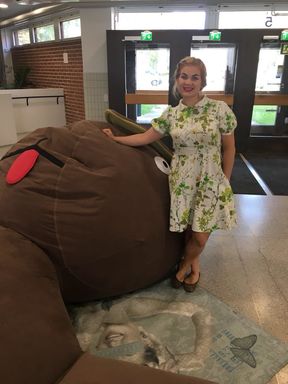Welcome to Espoo – let’s develop the community together!

This blog post was first published on AYY's old website on August 30, 2018.
Why did you come to Finland?
I’ve heard that’s the question people with foreign background are most often asked here. I’m not going to ask that. Of course you came to Finland! It’s the happiest country in the world with top quality education and a super active student culture. We have fresh air, lush nature (and snow!), room to breathe and to develop yourself. Now it’s up to you to make the most of your journey in the land of Nokia, Rovio and Junction (all from Espoo, by the way)!
I’m especially happy you chose to study in Espoo! Espoo is the second largest city in Finland (with 279,044 inhabitans, to be precise) and you’re one of the about 18,500 students in town. Innovation is a word you cannot avoid when talking about Espoo – we’re home to the biggest innovation ecosystem in Northern Europe, Espoo Innovation Garden, and we were named the Most Intelligent Community in the World in 2018. Not bad, eh?
Maybe the best thing about the innovation ecosystem in Espoo is that it’s strongly based on the idea of cooperation, peer-support and community, so don’t hesitate to get involved. Your journey into the community might start in the student organizations, continue to the startup scene, evolve to masters thesis work at one of the research organizations or companies, and before you notice, you’ve decided to stay here. All it takes is a curious mind, an active attitude, and building your networks from the day one.
Espoo is one of the most international cities in Finland – currently home to 155 different nationalities. According to estimations, the amount of foreign language speakers in Espoo will double by 2030, when we’ll have 30% of the working age population not speaking Finnish or Swedish as their mother tongue. We encourage everyone to learn Finnish or Swedish, as it makes integration into the job market and into the society much easier, but we also want it to be easy to settle down in Espoo and to use the services you are entitled to as our resident.
In 2017, the city council made the decision to introduce English as one of the languages of service in Espoo. We’re the first city in Finland to do this, and as there is no guide book for a process this size, we need your help. Please share your ideas and experiences about public services (e.g. health care, libraries, sport venues) and help us develop a city that works for everyone. The survey is open until 10.9.2018.
Kiitos paljon, and once again, a warm welcome to Espoo. we’re happy you decided to study here.
Milla Ovaska
The writer works as the Head of International Affairs in the City of Espoo and her favourite lunch spot in Otaniemi is in Dipoli. See you around!
P.S. My colleagues at VisitEspoo would get angry at me if I forgot to mention how awesome nature and culture Espoo has! National park, island hopping, museums and activity parks can all be found at www.visitespoo.fi
Read more news

What is Trinet, and what will happen to AYY’s internet connection?
The internet service provider for Aalto University Student Union (AYY) residents is about to change. We have heard that this change has raised concerns within the student community. In this article, Chair of the AYY Board Joona Lipponen responds to questions that concern our members.
The new polyteekkari flag finally raised in Otaniemi
The 15-year wait of the Otaniemi teekkari community was rewarded in early November, when the community ceremonially introduced the new polyteekkari flag at the 153rd Teekkari Tradition Ball. The previous flag that had united the teekkaris of Otaniemi was the flag of the Student Union of the Helsinki University of Technology, which served the community from 1909 to 2009 and was laid to its well-earned rest with the founding of the Aalto University Student Union. This is how the new flag came into being.
An electronic certificate is coming, what does it mean for students?
As part of the digitalization process in Finland, Aalto University is switching electronic degree certificates. AYY has been advocating against the digital certificate, aiming to ensure a physical token to graduates.
